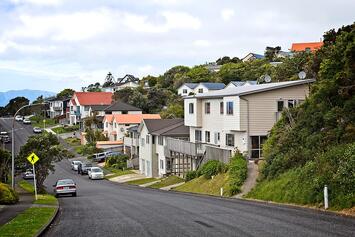
In recent weeks, more and more commentators are suggesting that house prices in New Zealand have started to fall, and are expected to fall further.
For many homeowners, especially those who have bought within the last year or two, this news will be terrifying, and for them I have a great deal of sympathy. They were sold the lie that house prices would always and everywhere rise much faster than incomes, and that therefore the best way to financial independence was to borrow to the maximum extent possible and buy a house – better still, several houses, the more the better.
The lie was aggressively promoted by the mainstream media, with constant references to the importance of “getting on the property ladder”, the implication being that once on “the ladder”, you would be carried onward and upward indefinitely.
And, for a great many people, following that advice has to date been a highly successful strategy, creating financial independence for many and financial fortunes for some. While I myself have never owned more than one home, the fact that I have always owned that one home has made a huge difference to my financial well-being – certainly a much bigger impact on my own financial position than any saving I have been able to do from the well-above-average salary I have been fortunate enough to earn throughout my career.
When I was Governor of the Reserve Bank I used to talk about the contrasting fortunes of my uncle and me, to illustrate the effect of inflation. In 1971, my uncle sold an apple orchard he had spent a life-time developing and, being of a cautious disposition, invested the proceeds in 18-year government bonds at 5.5% interest. Perhaps fortunately, by the time those bonds matured my uncle and his wife were dead, because the $30,000 for which he had sold his orchard was by then worth only a small fraction of what it had been worth in 1971. In 1971, $30,000 would have bought my uncle 11 Toyota Corolla cars. By 1989, $30,000 would have bought him just one Corolla, with a small amount of change left over.
By coincidence, in 1971 my wife and I returned from the United States to a very well-paying job in Auckland. We bought a five-bedroom home with a great sea view for $43,000, which was almost exactly three times my substantial salary. By the late eighties, the house was worth more than ten times what we had paid for it, and I have no doubt that today it would be worth several million dollars (I have had no financial interest in the house for more than 30 years).
This is surely a crazy situation – one where people can get extremely wealthy by borrowing a truck-load of money and waiting. (OK, there are some tenant management issues, though these can be, and often are, contracted out.)
The result of this situation is an enormous increase in wealth inequality in New Zealand. Contrary to popular myth, income inequality has not increased materially over the last 30 years, but wealth inequality certainly has done. And the main reason for that increase in wealth inequality must surely be the huge escalation in house prices.
Read the rest of this piece at Bassett, Brash & Hide.
Don Brash has been one of New Zealand's leading economic and financial policy advisers, and over the years he has provided advice to governments in many parts of the world - in New Zealand most obviously, but also in recent years in Indonesia, Cambodia, the Bahamas, Saudi Arabia, and the Pacific Islands.
He was Governor of the Reserve Bank of New Zealand (the nation's central bank) for 14 years. During his tenure inflation in New Zealand was reduced to its lowest level for several decades (1988-2002). Don led the Bank through the passage of the Reserve Bank Act of 1989, pioneering legislation which both established a relationship between government and central bank which was internationally unique at that time and made the objective of monetary policy unambiguously clear - achieving and maintaining stability in the general level of prices.
Don then served in Parliament from 2002 to 2007, and led the National Party into the 2005 election, nearly doubling its share of votes, though not winning the election.
Photo: by NZ Steve via Wikimedia under CC 4.0 License.












